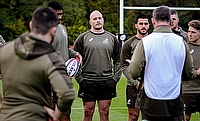Topsy Ojo: Black Lives Matter gives me hope that something can be sustained
Topsy Ojo believes we all have a collective responsibility if the Black Lives Matter movement is to be sustained.
In our latest episode of TRU Talks, Ojo said he was pleased by the initial response to the campaign which has seen a globe push for racial equality following the death of George Floyd in the United States.
The 34-year-old now hopes Black Lives Matter can be different to previous anti-racism initiatives, but insists everyone in society needs to pull together if a positive change is to happen.
“With a lot of movements and things that spark, it is sustaining them and keeping them consistent,” Ojo said.
“I guess we won’t really know the answer for probably three or six months to see what changes have really been made, and what progress has actually been made to know if this was just another flash in the pan and it was just words and there was actually no action behind it.
“The initial response over these first three or four weeks leads me to believe that this time will be different. I think there is so many more voices and not just black voices, white voices as well, and everybody is in support of this now so that gives me more hope that this is something that will be sustained.
“I think maybe that is a misconception sometimes that it is just about black people. It is not. We are all involved in this. It is from us, speaking up who have maybe been affected by it to others speaking up and saying actually, even though we have not been directly affected, we are not going to stand for it because it is unfair.
“Baseline, we are talking about equality and injustice which is really something which everyone can get behind. I think to really get to the root of the problem, it can’t just be a black issue. It is everybody’s issue.
“I think as long as we are collectively doing something and pushing in that direction, then we will get to that stage where equality is there and it becomes part of everyday society.”
Ojo recently appeared on a special Sky Sports podcast with Maggie Alphonsi, Will Greenwood and host Mike Wedderburn to discuss the debate around ‘Swing Low, Sweet Chariot’ following the song’s links to the American slave trade.
An underlying theme throughout the podcast was the view that educating people around black history will be key if change is to occur but Ojo believes focusing on subjects like ‘Swing Low’ has already give people the opportunity to learn more.
“I think that is one of the biggest positives so far because we are having conversations that we would never normally have,” Ojo said.
“We wouldn’t discuss it because it is uncomfortable and actually, I think people are welcome to learning more. Me personally, I said it on the podcast, the amount that I have learnt in the last three or four weeks in terms of black history, in terms of other people’s experiences, in terms of a collective mindset and how we push forward, I think it has been huge.
“If we are talking about rugby as a whole now, you are talking about the future of the game. You have got future participants, future kids coming through and making the game accessible to all.
“‘Swing Low’ was a big debate, but in the grand scheme of things, it was kind of a minor part of this look into this review into diversity and inclusion in rugby.”
Whilst Ojo believes educating people more will certainly be benefical, he insists society as a whole needs to accept that there is a problem before any further steps can be taken.
He added: “I’d probably say the first part is actually just accepting that it is an issue. With change and when change is this big, you are ultimately going to be met with a lot of resistance.
[People saying] things like ‘It’s not that big of a deal or I don’t see it, I’ve never experienced it, you’ve never said anything’.
"Before we can get people to a point where they are listening to the conversation, they have to accept that it is in society.
“Because of how long it has been going on, it is very subconscious. It goes on without even thinking about it, without even saying anything. It’s just there so we need to accept it is there and then start moving, what are the conversations which need to be had and how can we learn from that so going forwards, we are in a much better place.”








